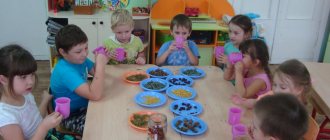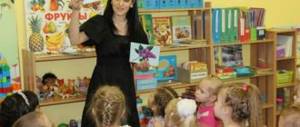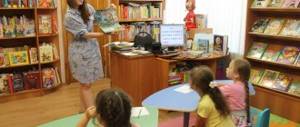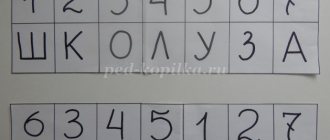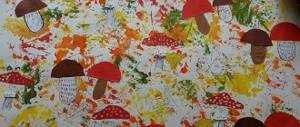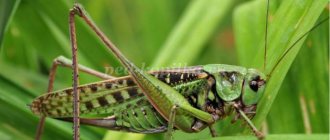Didactic games and aids for speech development of children of senior preschool age
Svetlana Toropova
Didactic games and aids for speech development of children of senior preschool age
Didactic games and aids for speech development of children of senior preschool age
The Federal State Educational Standards requirements for the results of mastering the program are presented in the form of targets for preschool education. At the stage of completing the preschool level, the child must have good command of oral speech, freely express his thoughts and desires, use speech as a means of communication, express his feelings, thoughts, and highlight sounds in words. Speech development of children is very important and relevant in preschool age.
Speech development tasks according to the Federal State Educational Standard:
Mastering speech as a means of communication and culture
enrichment of the active dictionary
development of coherent, dialogic and monologue speech
development of speech creativity
acquaintance with fiction, culture, listening comprehension of various texts, various genres of children's literature
formation of sound analytical-synthetic activity as a prerequisite for learning to read and write
development of sound and intonation culture, phonemic hearing.
To achieve and solve all problems of speech development it is necessary:
creation of a subject-development environment
selection of didactic, developmental, educational games and gaming aids
use of various methods, means, innovative technologies.
personal example of the teacher, his correctly delivered speech
consultations and various forms of work with parents on children’s speech development.
Activating children's speech using a variety of means.
In my work, to activate speech and solve all speech problems, I use the following games and gaming aids:
1. “Loto” using pure phrases for difficult sounds.
Children are offered or children themselves choose their cards, the principle of the game is like an ordinary lotto. The game is complicated by the need to repeat the correct phrase correctly, if the children know how to read, read it. Other reading children can check the correctness of the answer or determine the correctness of the pronunciation. As rewards, you can give not only cards for correct answers, but for example, counting sticks or buttons, pebbles; this is very attractive and energizing for children. If a child experiences difficulty, the teacher needs to help him, because it is difficult the first time, the game requires repetition.
For example: take the picture “Girl with balloons”
The child must repeat or read: “RY-RY-RY, I’M CARRYING BALLS” or For-for-for transparent jellyfish.”
2. “Guess the words”
The cards show two pictures, which may differ from each other when pronounced with the same sound. For example: “Cat” and “Whale”. Children select letters according to the picture, or you can complicate the task - ask a riddle. During the game, the teacher and other participants in the game can come up with riddles and a description of the object themselves. “What picture did I have in mind: this is a fluffy, mustachioed one...” The child guesses and selects the correct letter accordingly.
3. Didactic game “Gifts”
During this game, children develop sound analysis skills, the ability to determine the place of sound in a word.
Children are invited to collect gifts for the boy Roma, but all gifts must have the sound “r”. Children select pictures with a given sound, you can use diagrams, the place of the sound in the word. After the pictures have been selected, you can offer to find these toys in the group and go to visit Roma, then you can develop the role-playing game. There are many game options, fantasize yourself and with your children.
4. Games with punched cards
Punch cards are individual sheets of interesting tasks that are laminated or can be inserted into a thick file for repeated use.
The purpose of each card is different; it can be tasks such as developing phonemic perception, improving the skills of sound-letter analysis, syllabic analysis, reading syllables, composing syllables, words, sentences.
5. "Rebuses"
It’s not difficult to make these cards yourself.
2 strips are glued to the cardboard, one for inserting pictures based on the first sound of which words will be composed, the other below, for inserting letters.
You can use different options:
-which letter is missing (in the middle of the word, at the beginning or end)
- pictures or letters are placed correctly or incorrectly (self-control, mutual control)
- make a diagram
-arrange according to the diagram
6. “Syllable trainer”
Can be used in the role-playing game “School” using the following background:
-help the bear arrange consonants and vowels in the houses
-correct the bear's mistakes
-make up syllables
introduce using the Zhukova simulator to form syllables and words
-identify soft and hard sounds.
Personal trainers
7. Speech snails to reinforce the pronunciation of sounds
I have collected a card index of phonemic nursery rhymes
8. “Syllable Lotto”
The leading activity of preschool children is play; through play, the child learns about the world around him and develops comprehensively. These games contribute to the speech development of children, I hope they will be useful to you too.
Lesson on speech development in the senior group according to the Federal State Educational Standards
For speech development in the senior group according to the Federal State Educational Standard, the following tasks are set:
- Formation and activation of the dictionary.
- Improving the grammatical aspect of speech.
- Formation of sound culture of speech: differentiation of sounds.
- Improving dialogic speech.
- Teaching storytelling and retelling.
- Introducing children to fiction.
- Preparing children to learn to read and write.
Reading is a type of speech activity
Forms of work on speech development:
- classes (GCD);
- communication situations;
- games (didactic, theatrical, role-playing, finger games);
- project activities;
- work with books, works of art and holidays, theatrical activities;
Theatrical activities as a means of speech development
Developmental programs
If previously there was only one main work program, according to which teachers throughout the country worked, now there are several of them. For example, these are such well-known programs as “From birth to school”, “Success”, “Rainbow”, “Origins”, “Development”, “Montessori kindergarten” and many others. The programs differ in the structure of lessons, literary material, and teaching aids used. A mandatory general condition is compliance with the Federal State Educational Standard.
Developmental educational programs of preschool education that comply with the Federal State Educational Standard for Preschool Education are listed on the state register website.
On the School Guide website (link) you can find not only a complete list of educational programs, but also links to the contents of each program.
There are also partial programs. These programs are in addition to the main kindergarten program, for example: “Program for the development of speech of preschool children in kindergarten” by O. S. Ushakova. or “Young ecologist. Nikolaeva S.N.
Note! The most used program is the state program “From birth to school”. The work is carried out according to the manual by V.V. Gerbova “Speech Development in Kindergarten”.
Fragment of the work program for three months
October.
- Lexical exercises. Reading a poem.
- Let's learn politeness.
- Description of the dolls.
- Differentiation of sounds s-ts
- Compiling a story based on a picture.
- Practice selecting nouns for adjectives.
- Memorizing a poem
- Literary kaleidoscope
November.
- Reading poems about late autumn.
- Storytelling from a picture.
- Reading the fairy tale “Khavroshechka”.
- Working with sounds zh-sh.
- Teaching storytelling.
- Reading. Zhitkov “How I caught little men.”
- Retelling the story.
December.
- Reading poems about winter.
- Didactic exercise “Hockey”.
- Retelling.
- Working with sounds s-sh.
- Reading the fairy tale “The Silver Hoof.”
- Memorizing a poem.
- Didactic games with words.
Visual and didactic aid “Professions”
Methodological base or material necessary for conducting classes:
- methodological manuals;
- visual aids: series of paintings for kindergarten, toys, literature with illustrations, board games, natural objects, handouts, equipment for theatrical activities;
- technical means: tape recorder (any other type of audio player), computer, interactive board for showing presentations;
- periodically updated stands and exhibitions;
Speech development stands
Class structure
Start of class. Activation of knowledge, establishing connections with the material covered, communicating the goals of the lesson. The beginning of the lesson should arouse interest and attention to further work.
Automation of sound C
Important! Between parts of classes, 1-2 physical education minutes are planned.
Main part:
- leading teaching techniques are used depending on the type of lesson;
- independent work of children - answers, exercises, games (if required, then under the guidance of a teacher)
Note! Final part. Should be short and emotional. This could be reading a work of fiction, a didactic game, etc.
Examples of plans
Lesson plan on the topic “Reading the Russian folk tale “Khavroshechka””:
Introductory part: remember Russian folk tales known to children.
Main part:
- Reading a fairy tale
- Answers on questions.
- Final part: repeat the ending of the fairy tale collectively.
“From birth to school” - speech development in the senior group
The comprehensive program “From birth to school”, edited by N. E. Veraksa, M. A. Vasilyeva, T. S. Komarova, was developed on the basis of the main classical program of 1985, while its structure was changed and new material was included. Then the program was revised in accordance with the Federal State Educational Standard and is intended to form the main educational areas.
In the methodological manual by V.V. Gerbova has developed a methodology for working with children five to six years old, planning work for the year, there is additional material on working with children in the summer, reading material, an analysis of the characteristics of speech development in children of the sixth year of life.
Note! The senior group has two classes per week.
The content of each lesson is thought out and described in the manual: setting goals and objectives, preliminary work, detailed course of the lesson, methodology, didactic games.
Education through games and activities
Using the card index of didactic games, you can conduct separate game-lessons. Through play, it is easier to assimilate the norms of their native speech: children work actively, get tired less, and can play not only under the guidance of a teacher, but also independently. The work started in class should continue throughout the day with the help of speech games and exercises.
Targets at the stage of completion of preschool education
In the process of continuous work, by the age of 7, the child must:
- be able to adequately use 2–3 thousand words;
- construct sentences correctly using all parts of speech;
- reason and express your opinion;
- use set expressions correctly;
- explain the meaning of words;
- understand the rules for constructing a dialogue (first of all, pronouncing your remarks after the interlocutor has done so);
- develop the ability to compose oral texts of different genres (narration, for example, in a story about how the weekend went, description, if we are talking about commenting on a video or picture, reasoning, if you need to evaluate the actions of characters in a fairy tale;
In conclusion, it should be noted that the task of the kindergarten is to make full use of all possible means for the development of the preschooler’s speech. Only then will the diagnostic results show that the child is ready for further education at school.
Speech development of children 5-6 years old consultation for parents
Speech development of children 5-6 years old, consultation for parents does not take place one-sidedly (only by teachers), but in close contact with the family. One of the forms of interaction with parents is holding open lessons
GCD for speech development in the senior group according to the Federal State Educational Standard on the topic “Spring” (lesson notes):
Goal: To teach how to write a story based on a picture.
Tasks:
- development of coherent speech;
- replenishment and activation of children's vocabulary on the theme of spring;
- consolidation of knowledge about spring, the ability to name the signs of spring;
- development of artistic and aesthetic perception;
Equipment and materials: painting by A.K. Savrasov “The rooks have arrived.”
Painting “The Rooks Have Arrived”
Methodological techniques: verbal (use of a speech sample, conversation, assessment of children's speech), visual (showing a picture), gaming (didactic game).
Progress of the lesson
- Introductory part. Examination of drawings about spring made by the children themselves. Consolidating the word “landscape” in children’s vocabulary.
- Main part. Understanding the general content of the picture. Answers on questions:
- What is shown in the picture? In the center? Left? On right? Behind?
- What season?
- How did you know it was spring? (Rooks, puddles, thawed patches, shadows from birch trees, sunlight, fields without snow. Selection of adjectives for nouns.
- What do you think the month of spring is? What other spring months do you know?
- Description of the picture by the teacher (pronouncing a speech sample).
- Description of the painting by children based on the model. Along the chain: describe that part of the picture that the teacher will show (one child - one sentence).
At the end, give well-spoken children the opportunity to describe the picture in full.
Important! Take into account the characteristics of children: some can describe the whole picture, others only one detail in one sentence.
3. Assessment of children's speech activity.
4. Didactic game “Pass the ring - say the word”
5. Summing up the results of the lesson. Analyze the goals and objectives of the lesson in more detail, analyze the structure, methodological methods of work.
Exercises to correct the pronunciation of the sound [р]
Open lessons for parents
The most suitable and accessible lessons will also be lessons on learning a poem (V.V. Gerbova, p. 37, lesson 6, I. Belousova “Autumn”), composing stories (V.V. Gerbova, p. 51, lesson 2) , retelling (p. 57, lesson 8, V. Bianchi “Bathing bear cubs”)
Speech formation is a process that occurs in everyday life. Parents give their child a speech pattern. One of the additional types of work is organizing consultations in the form of a folding folder “Speech games on the way home.”
Fragment of a folding folder
Speech development while walking
Children's speech development also occurs during walks. This includes learning rhymes, chants, chants for outdoor games, individual testing of poems, reading poetry, and organizing observations.
By observing the changes in the area in winter, children expand their “winter” vocabulary and consolidate the names of the months - December, January, February (the same with other seasons). They compose stories based on impressions: “Titmouse at the feeding trough”, “Profession “janitor””, “How we planted flowers in the flowerbed”. The walk is a prime example of how educational areas can be integrated.
